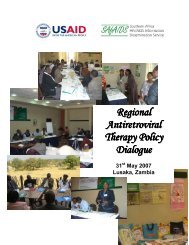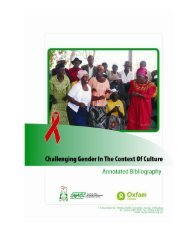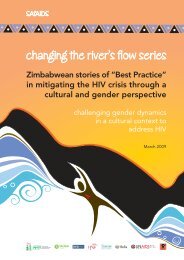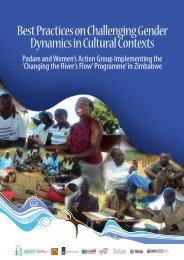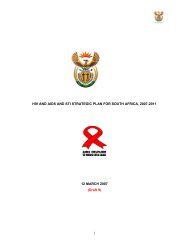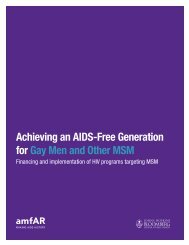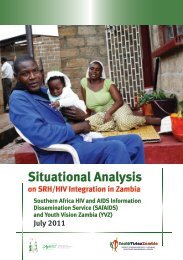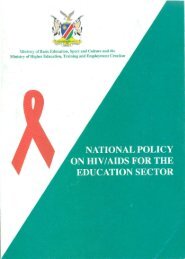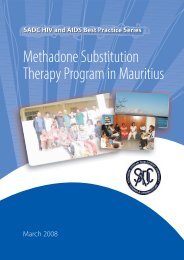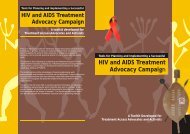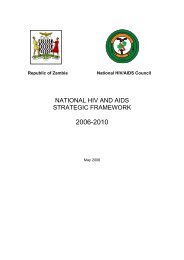Implementation of regional and international HIV prevention - SAfAIDS
Implementation of regional and international HIV prevention - SAfAIDS
Implementation of regional and international HIV prevention - SAfAIDS
- No tags were found...
Create successful ePaper yourself
Turn your PDF publications into a flip-book with our unique Google optimized e-Paper software.
11.0 MECHANISMS FOR CO-ORDINATION OFDEVELOPMENT ASSISTANCEMost African countries receive bilateral or multilateral development assistance that contributestowards the realisation <strong>of</strong> public <strong>HIV</strong> <strong>and</strong> AIDS service delivery objectives. There is a consensusthat, though such assistance can make a major contribution to achieving universal realisation<strong>of</strong> economic <strong>and</strong> social rights, there is a need for the quality <strong>of</strong> assistance to improve. Thishas been recognised by the Paris Declaration on Aid Effectiveness 11 <strong>of</strong> March 2005. The ParisDeclaration expresses the global commitment for donors <strong>and</strong> recipient countries to supportthe direction for reforming aid delivery <strong>and</strong> management to achieve improved effectiveness<strong>and</strong> results. Also relevant are the Guiding Principles on Civil Service Reform 12 , adopted in 1995by the Special Programme <strong>of</strong> Assistance for Africa (SPA), a group <strong>of</strong> aid agencies co-ordinatedby the World Bank.Both countries are signatory to the Paris Declaration on AID Effectiveness. The two countrieshave over the years expressed their willingness to support effective delivery <strong>and</strong> management<strong>of</strong> development assistance. They both endorsed the Accra Agenda for Action (AAA) on theacceleration <strong>and</strong> intensification <strong>of</strong> the implementation <strong>of</strong> the Paris Declaration on Aid <strong>and</strong>Effectiveness. The Accra Agenda for Action also acknowledges the role <strong>of</strong> civil organisations inadvancing aid effectiveness. Thus they are important as development actors, <strong>and</strong> also have animportant role in promoting accountability <strong>and</strong> in dem<strong>and</strong>ing results. Clause 16 specifies theintention <strong>of</strong> donors <strong>and</strong> Governments to building more effective <strong>and</strong> inclusive partnerships fordevelopments. They acknowledge that partnerships are most effective when they fully harnessthe energy, skill <strong>and</strong> experience <strong>of</strong> all development actors - bilateral donors, global funds, CSOs<strong>and</strong> the private sector.A comprehensive donor harmonisation framework that operates at national level wasdeveloped in Zambia in 2004. The framework is articulated in the Harmonisation in PracticeInitiative (HIP), which involves a Memor<strong>and</strong>um <strong>of</strong> Underst<strong>and</strong>ing that was signed in April 2004,initially by the Government with 15 development partners operating in the country. The MoUprovides the platform for developing the harmonisation <strong>of</strong> cooperation by developmentpartners <strong>and</strong> alignment to Government procedures <strong>and</strong> processes. The harmonisationframework addresses issues <strong>of</strong> common procurement <strong>and</strong> disbursement guidelines, pooledfunding, common monitoring <strong>and</strong> evaluation indicators <strong>of</strong> programmes, timely disbursement<strong>of</strong> donor commitments <strong>and</strong> reduction <strong>of</strong> bank accounts used to manage donor funds, amongother things. It is within the context <strong>of</strong> the harmonisation framework that the developmentpartners have agreed to prepare a Joint Assistance Strategy for Zambia (JASZ) covering theperiod 2006 to 2010, instead <strong>of</strong> independent planning instruments. The Bank Group, as asignatory to the Rome <strong>and</strong> Paris Declaration on Donor Harmonisation, actively participated inthe JASZ process between 2005 <strong>and</strong> 2007.11 The Paris Declaration on Aid Effectiveness 2005 expresses the <strong>international</strong> community’s consensuson the direction for reforming aid delivery <strong>and</strong> management to achieve improved effectiveness <strong>and</strong> results. TheDeclaration is grounded on five mutually reinforcing principles: Ownership-Partner countries exercise effectiveleadership over their development policies <strong>and</strong> strategies, <strong>and</strong> co-ordinate development actions; Alignment-Donors base their overall support on partner countries’ national development strategies, institutions, <strong>and</strong> procedures;Harmonization-Donors’ actions are more harmonized, transparent, <strong>and</strong> collectively effective; Managingfor results-Managing resources <strong>and</strong> improving decision making for development results; Mutual accountability:Donors <strong>and</strong> partners are accountable for development results.12 http://unpan1.un.org/intradoc/groups/public/documents/CAFRAD/UNPAN010830.pdf51



